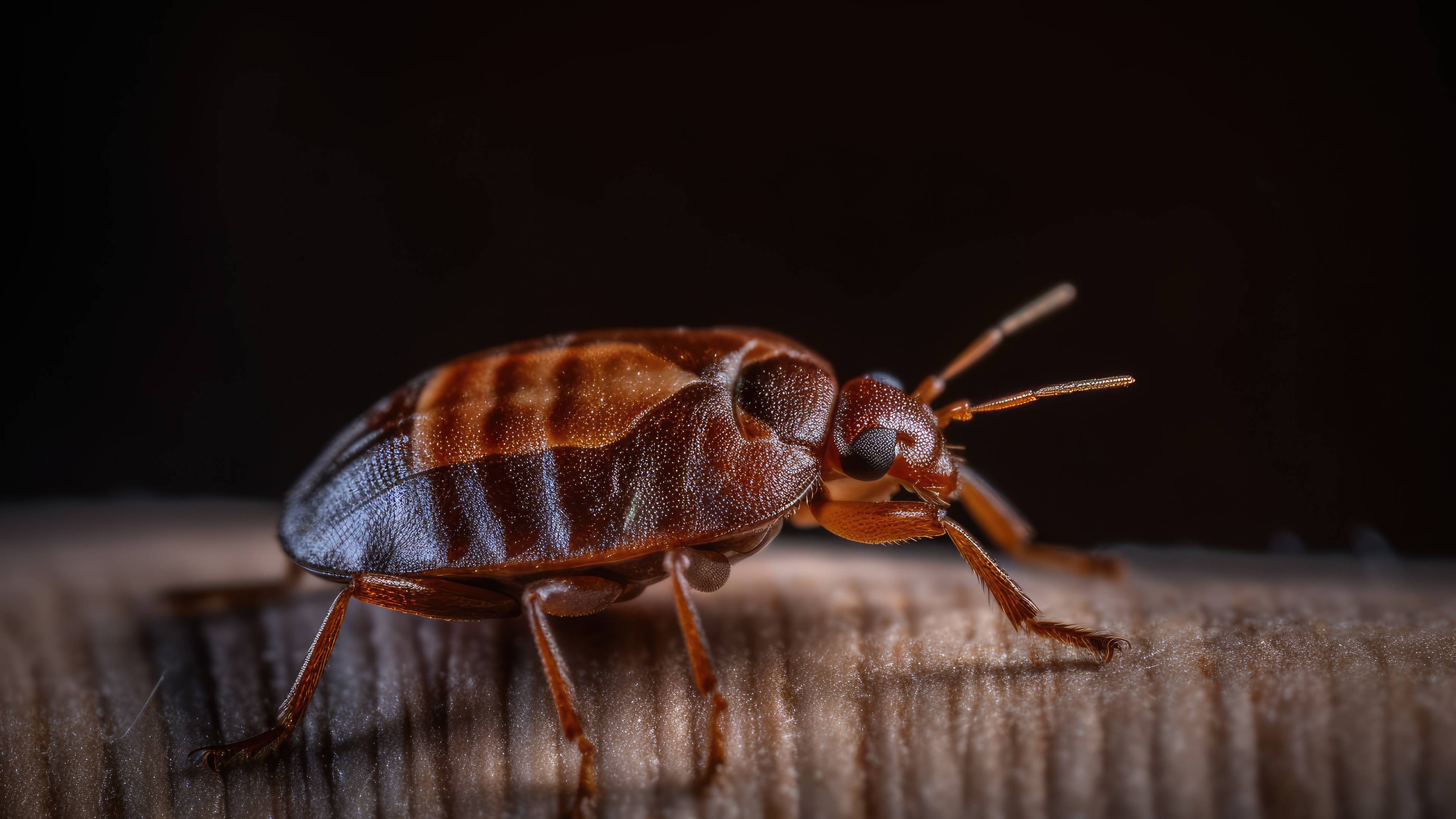Bed bug infestations are the last thing anyone needs! These persistent pests are more resilient than you might think, and their presence in storage units isn't as uncommon as you'd hope. Whether you're storing furniture, clothing, or other belongings, it's crucial to understand the risks when storing infested furniture in a storage space and take the necessary steps to prevent pest infestations.
What are bed bugs?
Bed bugs are small insects that feed on the blood of humans and animals. These tiny pests are, unfortunately, very good at hiding. If you have a bed bug problem, you'll quickly find out there are both hard to find and get rid of. Their name is a bit misleading, as they aren't actually confined to beds. As long as they have the right conditions, they can be found almost anywhere, including furniture, clothes, and cardboard boxes.
If you ever wake up with itchy bites covering your body, you probably have bed bugs.
One of the key problems with bed bugs is their reproduction rate. Female bed bugs can lay hundreds of eggs over their lifetime, and these eggs hatch within 6-10 days. Even a small infestation can quickly become a huge problem if left unchecked. If you're lucky and find the infestation early, then you can deal with it before it gets too dire.
Can bed bugs survive in a storage unit?

The short answer is yes. You might think storage units and other storage spaces wouldn't suit bed bugs. However, these highly adaptable pests can live in a myriad of conditions and storage facilities are one of their preferred environments. Dark and potentially humid environments, like a storage unit, are great breeding ground.
They are also typically filled with furniture, mattresses, and clothes, making storage units an ideal place for bed bugs to live.
Of course, without any blood, bed bugs can only survive so long. However, they are still able to survive for months on end, and potentially more than a year. So even if your furniture is left alone for months on end, there's still a chance you'll come back to pest-infested items.
Storage units provide some of the bed bugs' favourite hiding places, so if you get bed bugs, moving your items into storage is not a good solution
Without a blood meal, bed bugs can survive for several months in a dormant state. In some cases, they can even live for over a year, particularly if the storage unit offers the right conditions. This means that even if a storage unit remains unoccupied for a long period, bed bugs could still be lurking inside, waiting for the next opportunity to feed.
How long can bed bugs survive in storage units?
The survival rate of bed bugs can be affected by several things-
Temperature- Bed bugs thrive in temperatures between 21°C and 32°C. Extreme temperatures can be lethal to them. If the storage unit is exposed to extreme cold or heat, the bed bugs may die off sooner.
Humidity- humid environments can extend the lifespan of bed bugs, while dry conditions can shorten it. Bed bugs rely on a certain level of moisture to survive, so a dry storage environment is less hospitable to them. Climate-secure storage units may be ideal for this.
Food- Even though bed bugs can survive for a long time without feeding, they will eventually need blood. Blood is needed to feed and reproduce, so without it, they will die off eventually.
On average, bed bugs can survive between 2-6 months in storage spaces like storage units. With such a long lifespan, it's vital that you pest-proof your furniture and take measures to prevent a bed bug infestation.
Signs of a bed bug infestation in your storage unit
Finding a bed bug infestation in a storage unit can be tricky, especially since these pest infestations are so well hidden. Here are some indicators of an infestation to keep an eye out for
- Bed bug excrement – Small, dark, rusty spots on fabrics, cardboard boxes, or wooden surfaces may indicate the presence of bed bugs.
- Eggshells and shed skins – Bed bugs shed their skins as they grow, leaving behind small, pale skins. Finding these in your storage unit is a clear sign of bed bugs.
- Musty odour – Bed bugs have a distinct, musty smell, especially in larger infestations.
- Bugs – No doubt, if you spot a bed bug, you can't get a much clearer sign than that. The bad news is that if you're seeing them, then it's likely the infestation is quite large, and you should expect a lot of bed bug activity.
If you find any of these signs, then you should immediately investigate. Avoid DIY methods and seek professional help.
How to prevent bed bugs in a storage unit

Preventing bed bugs from infesting storage units requires a vigilant eye, and following good hygiene and cleaning practices.
- Inspect items – There should always be a thorough inspection of anything you plan to put into storage, especially furniture. Look for any signs of bed bugs, and if it's second-hand, you can be extra thorough. A lot of these second-hand items have spent time in conditions ideal for pests and bed bugs.
- Use protective coverings- Plastic wrap and vacuum-sealed bags are a good way to prevent bed bugs. Air-tight, plastic containers are good choices for smaller items.
- Don't store food – Many storage units don't allow stored food, with one of the reasons being that it can attract pests like bed bugs.
- Find the perfect storage operator – Storage facilities can feel like they are a dime a dozen, so finding the right one may be hard. Find a professional storage facility with glowing reviews.
A clean, well-maintained storage facility is less likely to have bed bugs. One problem here is that these storage facilities may not store infested furniture in the first place, because of the risk it brings to adjacent units. - Inspections – Regularly check your storage for any sign of infestation. This is also good practice if you're keeping items stored for a long time, as damage can still happen.
What to do if you find bed bugs in your storage unit
Discovering bed bugs in your storage unit can be alarming, but prompt action can help contain the problem. Here’s what you should do:
Remove infested items
Remove and isolate the infested items. Consider disposing of severely infested belongings to prevent the bugs from spreading further. Check each item has even the smallest piece of fabric could be infested.
Clean and treat the unit
Thoroughly clean the storage unit, paying close attention to cracks, crevices, and any items that were stored inside. Use pest control treatments designed for bed bugs to eliminate the infestation.
Seek professional help
Contact a pest control professional. Their expertise and tools effectively eliminate bed bugs from storage units.
Conclusion
Bed bugs can survive for a surprisingly long time in a storage unit, making preventive measures vital. Always inspect your belongings before storing them, and use protective coverings. Choosing a reputable storage facility can reduce the risk of a bed bug infestation and keep your items safe.
HOLD self-storage units will keep your belongings Pristine

If you’re looking for self-storage in London, HOLD Self Storage has got you covered. Our Kings Cross facility offers clean, climate-secure units with advanced security to protect your belongings. Whether you need short-term or long-term storage, our team is here to help.
Contact us today for a free quote or to learn more about our services.
Frequently Asked Questions
How long can bed bugs live in a sealed mattress?
Sealing furniture should be done to pest-free items. If a mattress is already infested with bed bugs, then they can still live up to a year. Always clean and treat your items before sealing them.
Can bed bugs get out of storage bins?
Yes, bed bugs and other pests can easily get out of plastic bins.
If you want to securely keep your items, put them in an airtight container. Airtight lids will prevent access in and out of the container as well.
How long can bed bugs live bagged up?
Even if you separate the items, they can still live just as long bagged up.
Bagging up items isn't a secure way of dealing with them, as pests can typically get out of most plastic bags. If you do bag up the items, take them to be treated immediately.
How does storage work at HOLD?
Self-storage works by renting a storage unit or space for a specified period. You can store your belongings in the unit and access them whenever you need to. It's like having your own personal storage space away from home.
What is included in the price for a HOLD unit?
You get private access to your own unit as well as 24/7 access. Our sites offer workspace pods for hire, providing a comfortable area with power, WiFi, printer access, and complimentary hot drinks. Please inquire with our teams for details.


